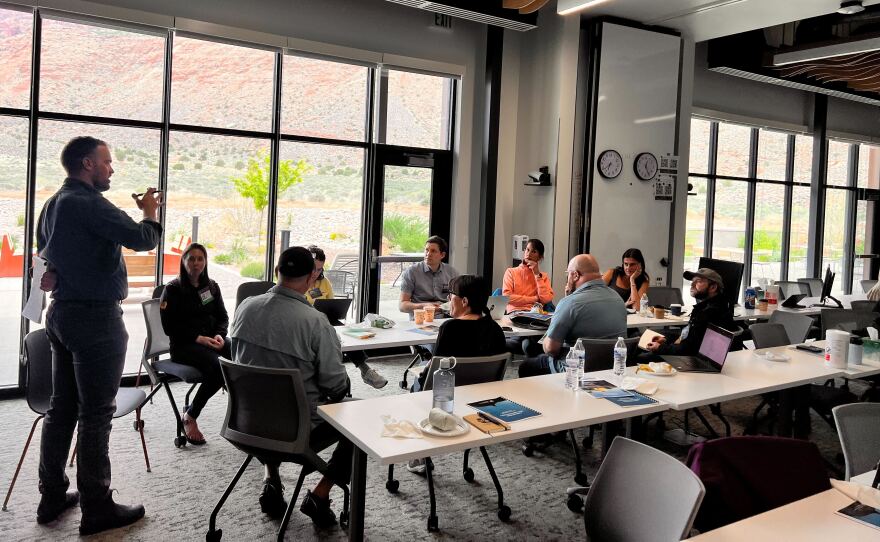The Colorado River, considered the lifeblood of the southwest, is so depleted that it no longer reaches the ocean. It supplies water to more than 40 million people, including two million residents along the Wasatch Front. Utah Public Radio has joined the new Colorado River Collaborative along with ten other media partners to report on how Utahns are impacted by this vital river and its shrinking water supply.
The collaborative, a branch of the Great Salt Lake Collaborative, kicked off at Utah State University’s Moab campus in late April. Journalists were treated to an early evening river trip on the Colorado just outside the Moab City limits.
“You guys might want to hold on, we are going to hit a little eddy line,” Lauren Wood said.
Lauren Wood, co-owner of Holiday River Expeditions, guided one of the five small rafts. During a fajita dinner on the river banks, Wood said she grew up on the Colorado and its banks. It’s not only her livelihood, it goes deeper.
“There’s a lot of great policy out there but what I want you to is there is also magic. There is also something ephemeral that is really hard to measure and there is a place for that story too and what we are fighting for,” said Wood.
Measured benefits include drinking water for millions of people in the U.S and Mexico, and irrigation of 5.5 million acres of farmland in the seven basin states, Utah, Colorado, Arizona, Wyoming, New Mexico and Nevada.
With a focus on stories that investigate what is working to protect the Colorado River, the eleven media partners will share stories that not only celebrate it but that also delve into the mire of political controversies surrounding it, the fate of the river ecosystems and its creatures, and more.
The new collaborative is supported by the USU Janet Quinney Institute for Land, Water, and Air. Along with Executive Director Brian Steed, Anna McEntire, Associate Director, helped launch this new initiative.
“I think lots of us have read stories about the Colorado River and thought ‘that does not mean anything to me. That’s not something that I need to care about," Anna McEntire said.
McEntire pointed out the Central Utah Project, where a diversion of the Colorado River supplements some of the drinking water along the Wasatch Front.
“All water systems are connected and when we are seeing a shortage in one area that means we are going to be affected far past the watershed. So if we are thinking about things from a larger perspective, we should all care about the Colorado River," said McEntire.
This article is published through the Colorado River Collaborative, a solutions journalism initiative supported by the Janet Quinney Lawson Institute for Land, Water, and Air at Utah State University.





